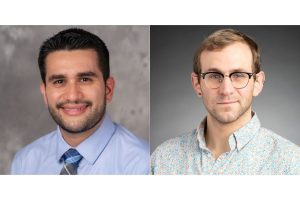Supported by a JHU SURPASS award, Professor of Materials Science and Engineering Corey Oses and Avi Bregman of the Johns Hopkins University Applied Physics Lab (APL) are developing a new type of reactor that can produce clean hydrogen fuel from water and heat at lower temperatures.

Corey Oses and Avi Bregman
The Johns Hopkins SURPASS awards support cross-divisional teams comprising affiliates in the Whiting School of Engineering (WSE) and APL who are seeking to solve some of the world’s most pressing problems. Oses’ and Bregman’s proposal—“ADD-H2: AI-Driven Discovery of High-Entropy H2 Generators”— was one of four chosen for this year’s grant cycle, which split $3.75 million between each recipient.
“We saw an opportunity in hydrogen since that’s where the energy market is headed in the next 25 years,” says Oses, who is also an associate faculty with the Ralph O’Connor Sustainable Energy Institute (ROSEI). “Hydrogen is incredibly abundant in the universe, but it’s always attached to something. If we can split it off into pure form and contain it well, we can use it as fuel for cars, houses, and more.”
The researchers aim to make hydrogen production more commercially viable. Currently, separating hydrogen from water (H2O) is challenging and requires electrolysis, which uses electricity to split water into hydrogen and oxygen. The team is exploring a different method to separate hydrogen without using electricity.
“We want to split hydrogen off from water using only heat, so there’s no longer a need for fossil fuels,” says Oses. “To do this, we need to develop a new type of heat catalyst that can perform the reaction at lower temperatures. We’ll be using AI to discover what works and how to optimize this process.”
Oses will use computer simulations to predict what will happen with water and heat in a reactor. The results should make the process efficient and cost-effective for potential consumers.
The origins of the project date back to November 2022 when Oses attended a ROSEI on APL event. There, he heard Jeff Maranchi, an APL program manager who is also a core ROSEI researcher, talk about APL and how to set up effective collaborations. Months later, the SURPASS award, which was filed through ROSEI, is the finished product of Oses pursuing those partnerships.
“ROSEI has been instrumental in developing collaborations with APL having met several contacts from ROSEI events,” Oses said. “Additionally, the ROSEI staff have been very helpful in understanding how to team with researchers there on funding calls.”
The SURPASS award will fund this project into 2025.
The original version of this story originally appeared on the JHU Department of Materials Science and Engineering website, and was written by Conner Allen.
